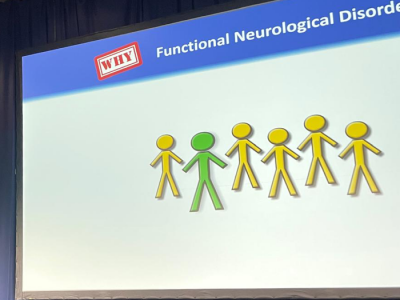
Reflective article on plenary session by Dr Elisabeth Mallam entitled Functional Nerological Disorder. This article was submitted as a condition of the author receiving a bursary place at PMG2024.
I offer my thanks again to Posture and Mobility Group in supporting me to attend the 2024 conference and the opportunity to reflect on the session delivered by Dr Elizabeth Mallam, Consultant Neurologist from the North Bristol NHS Trust on Functional Neurological Disorder (FND). The session was a great start to the conference this year, as from talking to multiple therapists, FND is a large part of many of our caseloads. Dr Elizabeth Mallam, delivered her presentation from a position of years of experience, providing a vast range of facts and information. I would therefore advise that you check out and listen to the recording of this session for yourselves.
The session was very informative, providing up to date information regarding FND. Whether or not a wheelchair should be provided was discussed. It was felt that it is an individual decision, after the medical diagnosis, and that the therapists are heavily involved in this. I found this interesting as it was clear that across the board there were many different opinions and perspectives on the provision of mobility equipment and the point at which a mobility aid should be provided in a patient affected by FND. The example that Dr Mallam used was thought provoking and highlighted the importance of the holistic approach to all clinical decisions: Reminding us that the patient is at the centre of that decision. She highlighted the difference between someone affected by FND and someone that wasn’t. The person with FND completed a long walk but then could no longer participate with other areas of their lives after this due to fatigue, whilst someone not affected by FND could complete the walk and then still participate with family life and other parts of life. It highlighted quality of life and choice for the patient to choose what they wanted or needed to be involved in.
It was great to hear about FND from an updated medical viewpoint, with the realisation that it isn’t always due to psychology stress/trauma. The importance of continuity of care and detailed assessments when equipment is being discussed was raised. The reminder of the importance of assessing the patient holistically is what I took from the presentation. The value of the Multi Disciplinary Team involvement in these decisions was highlighted, which will play a significant role in my practice. Ensuring a detailed assessment and discussion with the patient around their condition and the impact of provision is important to get a balance between recovery, function, management, and independence. Ensuring that all clinical reasoning to support decisions is recorded if equipment is provided and that patients can be reviewed in the future if circumstances change. In summary, the session was very informative to my approach of FND patients, and this is something that will impact my practice and be shared with my colleagues.
Reference
Bennett, K. Diamond, C. Hoeritzauer, I. Gardiner, P. McWhirter, L. Carson, A. Stone, J. (2021) A practical review of functional neurological disorder (FND) for the general physician. Clinical Medicine, (online) last acceded at https://www.ncbi.nlm.nih.gov/pmc/articles/P






.jpg)



no comments
Add your comment...